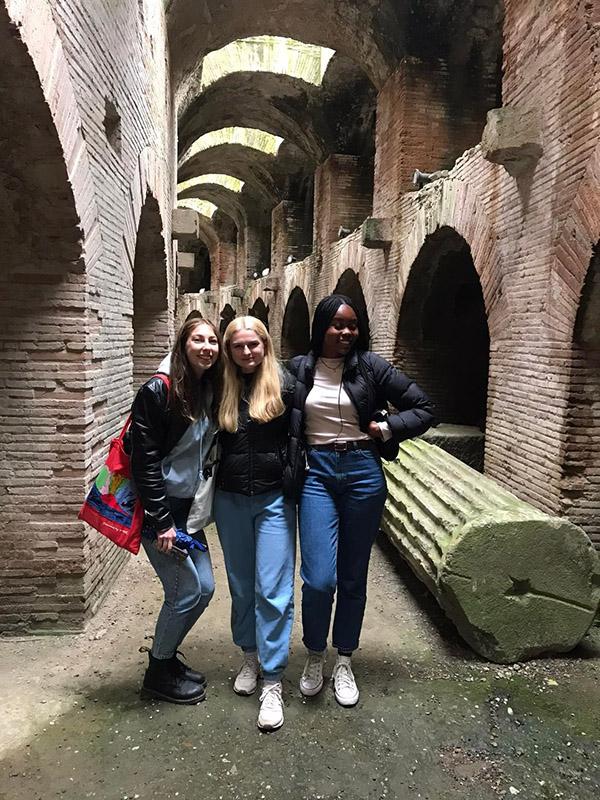What is Classical Studies?
Are you interested in languages, politics, gender studies, literature, religion, science, art, or medicine? If so, Classical Studies might be for you. Are you interested in how those fields interact with each other now and in the ancient world? If so, Classical Studies is definitely for you.

Madison Orlofski '23 (left) in the Puteoli amphitheater while studying abroad in Rome.
At Boston College, Classical Studies is the exploration of the ancient Mediterranean world—especially the cultures of the Greeks and Romans—and its complex influence on later times, right up to our own. Classics is a fundamentally multicultural and interdisciplinary field. It explores the complex interactions between and within communities, from Greek and Phoenician trading encounters in southern Spain to the city of Palmyra in modern-day Syria where archaeologists have found trilingual inscriptions (Greek, Aramaic, and Latin).
To learn about the experiences of these far-flung places and people, Classical Studies is interested in just about every angle of human existence, from economics to philosophy, sexuality to architecture. And we don’t stop by asking about how people lived, thought, worked, and loved long ago—we also ask how the inheritance and interpretation of all of those traditions have shaped later societies.
Classical Studies, like other fields, offers opportunities and imposes responsibilities. On the one hand, it provides an opportunity for deep consideration of what it is to be human. For instance, philosophy from 5th and 4th century Athens investigates what precisely the soul is, what is ‘the good,’ and how the universe functions; tragedy, from this same period, tests what emotional extremes a human being can endure. Yet on the other hand, any study of Greco-Roman cultures and their later global impact also demands consideration of various practices of domination (enslavement, subjugation, and empire). Ideas and models from ancient Greece and Rome were equally influential on Hitler’s Third Reich as they were to the foundation of American democracy.
Understanding the uses and abuses of the Classical past gives you tools to navigate the world around you and to shape it in your turn.
Our program in Classical Studies is extremely flexible: allowing you to study texts in translation only or, to continue—or even to begin—learning ancient Greek or Latin to an advanced level. Our survey courses in Greco-Roman history and culture are offered alongside more specialized topics such as multiculturalism, beast literature, ancient medicine, and Roman law.
Classical Studies, for you, might be an exploration of sources in translation such as the myths of Greece and Rome, types of political organizations and societal conflicts in the ancient Mediterranean world. Alternatively, this may be an opportunity to start learning ancient Greek or Latin, and after 2–3 semesters of study, encounter classical authors such as Homer and Cicero in their original form.
Our declared majors and minors have gone to a wide range of successful career trajectories. And while some continue to incorporate the ancient world in their professional lives, either through study at the graduate level or teaching Latin at high school, others use the skills they have honed in the analysis and organization of data, the formation of informed opinion, and advanced communication in a wide manner of ways. Our most common paths include law and med school; however, recent graduates have found purposeful work in the arts and media (e.g. associate producer CBS News, rock band drummer, digital publications at the British Museum) and in ethical care (i.e. professor of theology; pastor of youth and families).

